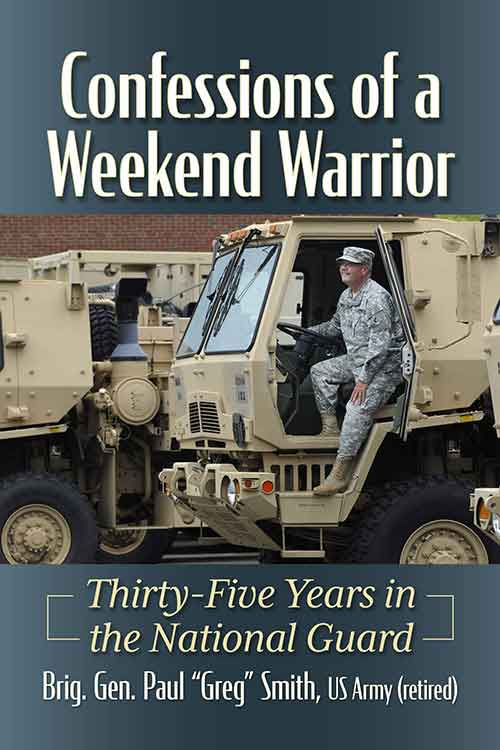By Brig. Gen. Paul “Greg” Smith.
Jefferson, NC: McFarland & Company, 2024.
ISBN 978-1-47669-410-8. Bibliography. Index.
Pp. vii, 238. $29.95.
Confessions of a Weekend Warrior offers a deeply personal and candid look at the evolution of the U.S. National Guard, more specifically the Massachusetts National Guard, and Brigadier General Paul “Greg” Smith’s personal military journey. During his career, the National Guard was transformed into a critical player in both overseas operations and domestic crises. Smith takes readers through his experience as a new cadet, beginning in the 1970s, to his command role during critical events like the 2013 Boston Marathon bombing. Throughout, Smith weaves together themes of leadership, duty, and the evolving responsibilities of the National Guard, giving insight into the organization’s growth and the complex challenges of command.
Smith paints a vivid picture of leadership in action, often balancing the responsibilities of a military career with civilian life. He describes his early years in the Guard, learning lessons in leadership and perseverance, especially in moments where he had to stand firm in his convictions, even against opposition by choosing the hard right over the easy wrong as his platoon bellowed insistently to leave the trail vehicles in the convoy. His experiences also highlight the moral complexities of military service—dealing with issues such as race relations, sexual harassment, and the personal cost of decisions affecting his soldiers. Smith’s reflections on his leadership style, especially the importance of compassion, praise, and accountability, resonate as critical lessons for readers as he recounts stories of standing up for soldiers despite their mistakes. While never formally serving on active duty, Paul consistently managed the rigors of military operations, resolutely focusing on what was morally right, fair, and just for the soldiers. Usually reserved for noncommissioned officers in the Army, Smith has an uncanny approach to leadership that is a bit of a departure from his otherwise “stuffy” officer counterparts.
Among the central themes is the delicate balance between enforcing discipline and showing empathy. Smith often emphasizes the power of personal connection and understanding the human element within command. Whether dealing with soldiers facing punishment for misconduct or advocating for those in need of grace, he highlights the importance of seeing soldiers as individuals, not just subordinates. Smith was relieved when Don’t Ask, Don’t Tell was repealed, stating that the “brotherhood of service” that transcends race, gender, or background speaks to the unity that military life fosters and differing backgrounds and beliefs does not determine the quality of soldier.
Smith and his leadership abilities would be tested often in his career as he navigated the officer ranks, assuming command after command. In particular, he shares the personal struggles of losing soldiers under his command, the emotional toll of delivering tragic news to families, and how the weight of leadership can affect mental health and morale. His discussion of soldier suicide and delayed mourning processes opens a conversation on the psychological burdens that military personnel face, underscoring the importance of addressing mental health in the armed forces. Through his leadership journey, Smith learned that adaptability, collaboration with other agencies, and empowering junior leaders were crucial to mission success, especially during disaster responses like Hurricane Katrina or the aftermath of the Boston Marathon bombing. His final reflections on his career, including the mixed emotions of retirement, round out a story of dedication, growth, and humility in service to the nation.
Confessions of a Weekend Warrior serves as both a memoir of military life and a guidebook for those looking to understand better the leadership challenges faced by the National Guard, as it transitioned from a weekend training force into an indispensable arm of the U.S. military, as well as countless other noncommissioned officers looking to learn how to navigate the rigors of leadership. This book is a must-read for leaders who value human connection and seek to lead with dynamism and vigor in today’s modern military age, where the focus has been firmly realigned to people first and mission always.
Master Sergeant Grant Christopher Smith, USA
Nashville, Tennessee
